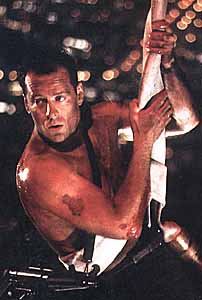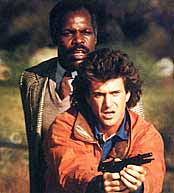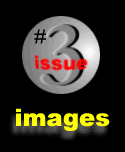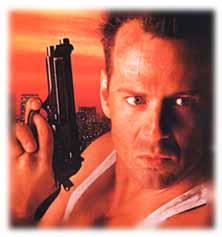|

In her book Hard Bodies, Susan Jeffords sees the explosive box-office success of action/adventure films in the 1980s as reflective of the hubristic confidence and vitality of the Reagan administration. Like the image of the Cowboy President, America was attracted to the reactionary bravado of action film Heroes--after many had questioned in the '60s and '70s if Americans could still be heroic. Robin Wood describes the pre-Reagan era in Hollywood from Vietnam to Reagan: "since the early '60s, the central theme of the American cinema has been, increasingly, disintegration and breakdown . . . [with the '70s as] the period when the dominant ideology almost disintegrated" (28). This was the period of anti-heroes, of lost men, disillusioned and unconnected to society, as seen in the Death Wish series, Butch Cassidy and the Sundance Kid, Nashville and The Marathon Man. However, in the 1980s blockbuster, adrenaline-pumping films, the ideal of the "real man" returned with a vengeance, presenting tough guys who can get the job done.
 But like earlier Heroes, these pumped-up Heroes are still slaves of society, no matter how masterful they may seem. They are still incapable of escaping the ultimate demands of their "job," whether that job is as a cop, archaeologist, soldier or superhero. Their methods may not always be orthodox, but their duty may be more confining than standard procedure. In Lethal Weapon, Murtaugh and Riggs are both cops, but Murtaugh is allowed to be a family man first; as a Hero, Riggs has been ordained solely to the cause of justice. Though Clark Kent and Bruce Wayne may appear to be voluntary Heroes, their special gifts (superpowers and money) have created in them a sense of obligation to society that they cannot lay down. Though love interests abound, permanent relationships are impossible: in Superman II Clark Kent undoes his intimate relationship with Lois Lane; Bruce Wayne and Indiana Jones have a new girlfriend per film. With emotion seen as a liability, these Heroes are often not even allowed to be particularly interesting people: as Emerson said, "Every hero becomes a bore at last." So it is not uncommon for villains in this genre to steal the show: Lex Luthor in Superman, Joker in Batman, and wherever actors like Gary Busey, Tommy Lee Jones, or James Woods may show up. But like earlier Heroes, these pumped-up Heroes are still slaves of society, no matter how masterful they may seem. They are still incapable of escaping the ultimate demands of their "job," whether that job is as a cop, archaeologist, soldier or superhero. Their methods may not always be orthodox, but their duty may be more confining than standard procedure. In Lethal Weapon, Murtaugh and Riggs are both cops, but Murtaugh is allowed to be a family man first; as a Hero, Riggs has been ordained solely to the cause of justice. Though Clark Kent and Bruce Wayne may appear to be voluntary Heroes, their special gifts (superpowers and money) have created in them a sense of obligation to society that they cannot lay down. Though love interests abound, permanent relationships are impossible: in Superman II Clark Kent undoes his intimate relationship with Lois Lane; Bruce Wayne and Indiana Jones have a new girlfriend per film. With emotion seen as a liability, these Heroes are often not even allowed to be particularly interesting people: as Emerson said, "Every hero becomes a bore at last." So it is not uncommon for villains in this genre to steal the show: Lex Luthor in Superman, Joker in Batman, and wherever actors like Gary Busey, Tommy Lee Jones, or James Woods may show up.
In her cataloguing of Hard Bodies, Jeffords includes Die Hard (John McTiernan, 1988) as a film belonging unquestionably to this genre. However, I believe Die Hard both follows and begins to deconstruct this trend at the same time.
Throughout the film, John McClane is an emasculated, marginalized man. He identifies himself as a New Yorker and a cop, but his wife has invalidated his identity by moving to California with his children to pursue her own career, effectively castrating him. John McClane is consistently seen as out of his element, though managing to keep sight of what is important to him and his sense of humor.
Jeffords sees the terrorist leader Hans Grubers' identification of John McClane as a cowboy as proof of John's self-definition as a Hero. She points out the contempt behind Hans' remarks as well as their linkage to Reagan's presidential image: "as Grubers' comments indicate, those [Reagan] values are posed as childish as well, referring largely to television dramas and Hollywood stars that were the childhood heroes of today's aging combatants" (61). But she glosses over John's response: "I was always kind of partial to Roy Rogers, actually." John underscores this identification by choosing "Roy" as his code name, and adopting Roy Rogers' language: "yippie-kay-yea," "pardner," and "happy trails."
page 1 of 3

|





 But like earlier Heroes, these pumped-up Heroes are still slaves of society, no matter how masterful they may seem. They are still incapable of escaping the ultimate demands of their "job," whether that job is as a cop, archaeologist, soldier or superhero. Their methods may not always be orthodox, but their duty may be more confining than standard procedure. In Lethal Weapon, Murtaugh and Riggs are both cops, but Murtaugh is allowed to be a family man first; as a Hero, Riggs has been ordained solely to the cause of justice. Though Clark Kent and Bruce Wayne may appear to be voluntary Heroes, their special gifts (superpowers and money) have created in them a sense of obligation to society that they cannot lay down. Though love interests abound, permanent relationships are impossible: in Superman II Clark Kent undoes his intimate relationship with Lois Lane; Bruce Wayne and Indiana Jones have a new girlfriend per film. With emotion seen as a liability, these Heroes are often not even allowed to be particularly interesting people: as Emerson said, "Every hero becomes a bore at last." So it is not uncommon for villains in this genre to steal the show: Lex Luthor in Superman, Joker in Batman, and wherever actors like Gary Busey, Tommy Lee Jones, or James Woods may show up.
But like earlier Heroes, these pumped-up Heroes are still slaves of society, no matter how masterful they may seem. They are still incapable of escaping the ultimate demands of their "job," whether that job is as a cop, archaeologist, soldier or superhero. Their methods may not always be orthodox, but their duty may be more confining than standard procedure. In Lethal Weapon, Murtaugh and Riggs are both cops, but Murtaugh is allowed to be a family man first; as a Hero, Riggs has been ordained solely to the cause of justice. Though Clark Kent and Bruce Wayne may appear to be voluntary Heroes, their special gifts (superpowers and money) have created in them a sense of obligation to society that they cannot lay down. Though love interests abound, permanent relationships are impossible: in Superman II Clark Kent undoes his intimate relationship with Lois Lane; Bruce Wayne and Indiana Jones have a new girlfriend per film. With emotion seen as a liability, these Heroes are often not even allowed to be particularly interesting people: as Emerson said, "Every hero becomes a bore at last." So it is not uncommon for villains in this genre to steal the show: Lex Luthor in Superman, Joker in Batman, and wherever actors like Gary Busey, Tommy Lee Jones, or James Woods may show up.
